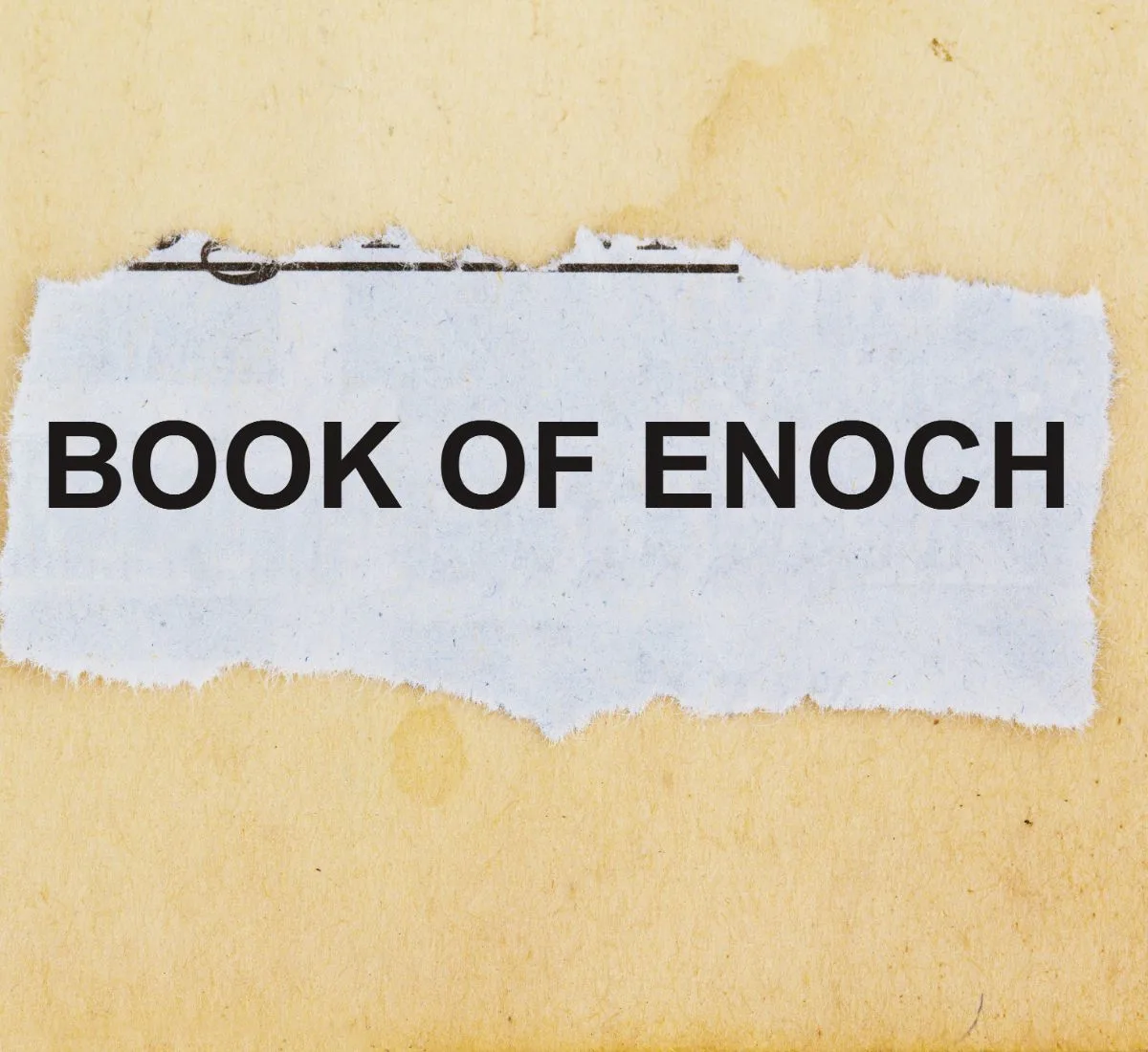Question – why is the Book of Enoch not in the Bible?
Introduction
The Book of Enoch is something that is shrouded in mystery and curiosity. However, some have been Christians for a substantial period of time and have never heard of the book.
Once they hear of it, they generally tend to have questions like, “Why isn’t it in the Bible?” and “Was it ever in the Bible?”
These are fair questions to ask, and we must always remember that not only is it not wrong to ask questions, but it is good to ask questions.
The thing about truth is that it will always withstand questioning.
If cracks are found, and it is found to be false, then it was never true in the first place.
So, why is the Book of Enoch not in the Bible, and is the Bible incomplete?
Let’s check it out.
Was the Book of Enoch ever in the Bible?
There seems to be a misconception among people pertaining to the question of the Book of Enoch having been taken out of the Bible.
Some say that the Book of Enoch used to be in the Bible but was taken out because the Jews were uncomfortable with its contents, and it didn’t line up with what they believed to be true.
However, this is not the case.
The Book of Enoch was never in the Bible, to begin with.
It can’t have been taken out or removed because it was never considered Scriptural canon in the first place.
Instead, it has always been considered an extra-biblical book (extra as in outside of, not as in more biblical) and has never been considered canon to the Bible since the beginning of the Bible’s construction.
How was the Bible put together?
One crucial question to this discussion is how the Bible was put together in the first place.
If you have studied Scripture for very long, you know that there are quite a few books that exist that could have been in the Bible but aren’t.
These are things like extra Gospels written by other people and even the history books of the Apocrypha that do appear in some Bibles.
So, what gives?
How was it even decided upon in the first place what would be included as canon and what wouldn’t?
There is some debate over the answer to this question.
For example, one idea that has been common for many years, especially when pushed by the popular book, The Da Vinci Code, is that a council was held in Nicaea many years ago where a few people decided what the biblical canon would be.
This myth has pushed the idea that the biblical canon was established as a power play or a way to push a few people’s ideas onto many by so-called religious authority. However, it turns out that there is actually no historical evidence to suggest that this council specifically created the biblical canon.
The historical evidence suggests otherwise.
Instead, many biblical canon lists have been found that predate this council of Nicaea.
Looking at this and much other early evidence shows us that the boundaries of biblical canon were being debated long before the council of Nicaea.
Instead of the canon being decided in one meeting by a few people, it appears that over many years and by many people, Scripture was found to be so by the hand of God.
Each book went through rigorous testing and study to discover whether it should be included in the biblical canon, and the result is what we have today.
Many things were considered, such as authorship, the time in which it was written relative to the events of which it writes, and eyewitness testaments to the same events.
Yes, the way that the book compared to the existing Scriptures mattered, but they didn’t merely choose books that they agreed with.
Why was the Book of Enoch not included?
According to these standards that were used to universally determine the biblical canon, the Book of Enoch simply does not stack up.
Even looking at one of the very first criteria that they would consider, its authorship is unknown and falsely attributed to Enoch.
Therefore, it was not included in the canon of Scripture due to it not being as sound as the rest of the books included.
READ MORE: Can God forgive a murderer?
Another Aspect
The other aspect that must be considered when having discussions like this is the fact that if one believes in God and His Word, one should also believe that God put the Bible together in the way that He wanted it, including the books that should have been included, and gave us the information that we need with what is in the biblical canon.
Of course, we should always look at facts and evidence to create conclusions. However, when it comes to religion and God, there is also an aspect of faith that should not be forgotten.
Have faith that God has given you all that you need, according to 2 Timothy 3:16-17.
READ MORE: Did Jesus drink water while fasting for 40 days?
What should we do with the Book of Enoch?
So then, what should we do with the Book of Enoch?
Should we throw it out completely as heresy, or should we read it with a grain of salt?
As I previously mentioned, the truth can take criticism.
If it is really the truth, it will stand firm.
Therefore, I believe that reading these extra-biblical books can be helpful to get the full context of the Bible as long as one has a sound mind while reading them.
If you choose to read the Book of Enoch, take everything you read with a grain of salt and do not take it as Scriptural authority. However, as long as you have the true Word of God in mind and you know what is fundamentally true, use that as a lens through which you can view extra-biblical works.
The Book of Enoch was not divinely inspired
One of the reasons the Book of Enoch was not included in the Bible was because it was believed not to be divinely inspired.
What does that mean? Simply put, the content of the book was not revealed to the authors by the Holy Spirit.
Or the Holy Spirit did not inspire the authors to write the book. Therefore, the Book of Enoch is considered unworthy to be consumed by believers because it will not aid their spiritual growth.
This criterion for selecting Scripture to be added to the Bible can be found in 2 Timothy 3:16. “All Scripture is given by inspiration of God, and is profitable for doctrine, for reproof, for correction, for instruction in righteousness.”
Unfortunately, the Book of Enoch did not fulfill this criteria. Various teachings of the book do not correlate with the other books of the Bible.
Some of the topics covered in the book include esoteric teachings regarding cosmic mysteries, apocalyptic visions, and angelic hierarchies.
The early Christian leaders believed the Bible was silent about this information for a reason.
So, other factors like the authorship not being known and the book not being quoted in the New Testament gave more credence to it not being considered fit to be included in the Bible.
Not all books will be considered Scripture.
God has given people revelations, which they have written as books.
These books can serve as study guides but cannot be labeled Scripture.
So, the Bible is the complete Word of God. Therefore, the Book of Enoch is not Scripture and must be read with such understanding.
What does this mean to believers?
God is all-wise.
He knows what we need as believers to grow spiritually.
That is why He revealed His truth to Bible authors.
We must be careful in our quest for information or knowledge because just as a lack of knowledge destroys, too much knowledge can also wreak havoc on our souls.
King Saul sought after Samuel’s spirit through a medium, leading to his end and destruction.
We must stick to the Bible.
We shouldn’t seek out hidden knowledge apart from God’s Word if our Bible teaches that Jesus died, was raised on the third day, ascended into heaven, and gives us authority through the Holy Spirit.
The devil is seeking ways to distract us from the truth.
Jesus said, “I am the way, the truth, and the life. No one comes to the Father except through Me” (John 14:6).
Our passion should be directed toward chasing Jesus, the ultimate truth.
He is all we need. And God has generously given Him to us (John 3:16).
If you know Jesus, the truth, you will be free from chains and destruction (John 8:32).
READ THIS NEXT: Who are the Watchers in the Book of Enoch?
- About the Author
- Latest Posts
Bulgarea Anca is a devout Christian and the founder of Bible Wings, a comprehensive resource for Christians seeking to deepen their faith and understanding of the Bible. Raised within the Christian faith, Bulgarea Anca’s spirituality was nourished by her grandparents, who were cantors in their local church. Her Christian upbringing was further solidified by her education at a Christian school. Today, she uses her in-depth knowledge of the scripture to provide insightful and meaningful content through Bible Wings.

